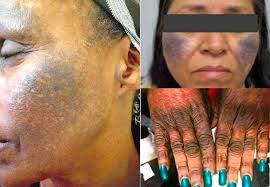Nigeria’s Minister of State for Health and Social Welfare, Dr. Iziaq Salako, has urged African women to embrace their natural beauty, warning against the dangers of skin-bleaching practices.
Speaking at a regional workshop in Gabon focused on eliminating lightening cosmetic products, Salako emphasized the need to revive the “Black is Beautiful” movement to combat harmful beauty standards and promote self-acceptance.
In a speech shared with the News Agency of Nigeria (NAN), Salako appealed to influencers, celebrities, and community leaders to champion Afrocentric beauty and debunk myths that associate lighter skin with success and attractiveness.
“Through collective action, we can address the root causes of skin bleaching and encourage healthier, more inclusive perceptions of beauty,” he said.
The minister highlighted a World Health Organization (WHO) report identifying Nigeria as the global leader in skin bleaching, with 77% of Nigerian women using skin-lightening products. He added that studies by the Cosmetics Safety Management Programme (CSMP) revealed that 52% of cosmetic manufacturers in Nigeria include skin-lightening agents in their products.
Salako cautioned against the misconception that “toning” is safer than bleaching, stressing that many skin-lightening products contain harmful substances such as mercury, hydroquinone, steroids, and heavy metals like arsenic and lead. These chemicals, he noted, pose severe health risks, including organ damage, neurological complications, and cancer.
“The widespread use of these products in Nigeria and across Africa calls for urgent public health campaigns, stricter enforcement of regulations, and grassroots advocacy to combat the practice,” Salako said.
He praised the efforts of the health ministry and the National Agency for Food and Drug Administration and Control (NAFDAC), highlighting measures such as the 2019 Cosmetic Products (Prohibition of Bleaching Agents) Regulations, which banned harmful agents like mercury and limited hydroquinone concentrations to 2%.
In addition, the government is developing guidelines for cosmetic product safety assessments to ensure compliance with international standards.
The WHO’s 2023 fact sheet reveals that skin bleaching remains a pervasive issue in Africa, with usage rates of 25% in Mali, 32% in South Africa, 39% in Ghana, 50% in Senegal, and 66% in Congo-Brazzaville. Nigeria leads globally, with 77% of women using these products.
Salako attributed this trend to societal pressures linking lighter skin to beauty, success, and wealth. While countries like Ghana, South Africa, and Mali have banned skin-lightening products, weak enforcement allows their continued availability in markets.
The minister called for sustained efforts to dismantle these harmful standards and promote health and self-acceptance among African women.


